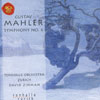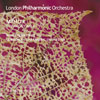Mahler Symphony No.6
Zinman’s new Mahler recording is upstaged by a classic account from Tennstedt
View record and artist detailsRecord and Artist Details
Composer or Director: Gustav Mahler
Genre:
Orchestral
Label: Red Seal
Magazine Review Date: 8/2009
Media Format: Hybrid SACD
Media Runtime: 0
Mastering:
Stereo
DDD
Catalogue Number: 88697 36465-2

Tracks:
| Composition | Artist Credit |
|---|---|
| Symphony No. 6 |
Gustav Mahler, Composer
David Zinman, Conductor Gustav Mahler, Composer Zurich Tonhalle Orchestra |
Composer or Director: Gustav Mahler
Genre:
Orchestral
Label: LPO
Magazine Review Date: 8/2009
Media Format: CD or Download
Media Runtime: 0
Mastering:
Stereo
ADD
Catalogue Number: LPO0038

Tracks:
| Composition | Artist Credit |
|---|---|
| Symphony No. 6 |
Gustav Mahler, Composer
Gustav Mahler, Composer Klaus Tennstedt, Conductor London Philharmonic Orchestra |
Author: Edward Seckerson
You want to rough up Zinman’s Mahler: it’s so orderly, so clean. Its shortcomings don’t stem from the musical values – which are high – but rather from its temperament and its characterisation, its refusal to push all those familiar trappings of Austro-German symphonic music to the nth degree. That dissonant appoggiatura at the close of the first movement is a gigantic moment which the likes of Bernstein (DG) or Tennstedt (see below) blow out of the water. And before anybody invokes those well-worn phrases “self-indulgent” or “too subjective”, let me remind you that Mahler was nothing if not both.
Speaking of Bernstein and Tennstedt, neither chose to play the Andante second (which is another debate – though, unfashionably, I still subscribe to that original ordering and refute claims that there is no hard evidence to support it). Zinman’s Tonhalle Orchestra play it with exalted rapture, its climax achieving a level of intensity so conspicuously missing from the first movement. The ensuing Scherzo is certainly grotesque (weighty) in tempo, though less so in colour and cast. And the matter of life and death which is Mahler’s harrowing finale is darkly surreal and undeniably impressive with stonking hammer blows. So why am I stirred but not shaken? Could it be as simple as Zinman and his players not venturing close enough to the edge? At any rate the “shock and awe” never quite materialise.
The LPO disc arrived within days of David Zinman’s account. Having struggled to be fair to Zinman and try to explain what makes his Mahler so accomplished but so intrinsically wrong, along comes this live Tennstedt to demonstrate what words really cannot, that Mahler was/is a force of nature and only those displaying real empathy with his life and persona can truly bring it off the page.
Tennstedt exposes every nerve-ending of the piece from start to finish. The trenchancy I miss from Zinman is there with a vengeance from the word go – big-boned and punchy with snappy trombone accents. Alma’s theme burgeons, the Albert Hall acoustic accentuating the bigness with strident clarinets and the ripest horns. Big sounds, big rubatos, big everything. Zinman may achieve a rarefied beauty in the rapt cow-bell-festooned middle section but Tennstedt feels more personal, more “connected”, to the ache in the recollection of Alma’s theme and as the movement propels to its major-key (and short-lived) resolution, there is a desperation that Zinman barely hints at.
But it is the parodistic grotesqueries of the off-kilter Scherzo that really show up the real Mahlerian from the counterfeiter. Here’s why Mahler’s first (and I believe last) instinct was to place the Scherzo second. With Tennstedt the shock of that hellish descent back into A minor – with the march rhythm now dislocated to suggest an army of undead amputees – is seriously unsettling. And lest anyone suggest (as they so often do in criticism of Bernstein) that Tennstedt is guilty of over-egging the Trios of this movement, let them consider the objective: the very essence of caricature (be it a Viennese ländler or some other awkward country dance) is exaggeration.
So it’s a corker, this performance. It sounds pretty good for 1983, though the BBC fashion then for a more “open” sound slightly compromises the unflinching immediacy of the reading. And what a shame, after all the fantastical trials and tribulations of the finale, writ so thrillingly large here, that some idiot cannot resist yelling “bravo” to effectively destroy the fade to black at the close.
Discover the world's largest classical music catalogue with Presto Music.

Gramophone Digital Club
- Digital Edition
- Digital Archive
- Reviews Database
- Full website access
From £8.75 / month
Subscribe
Gramophone Full Club
- Print Edition
- Digital Edition
- Digital Archive
- Reviews Database
- Full website access
From £11.00 / month
Subscribe
If you are a library, university or other organisation that would be interested in an institutional subscription to Gramophone please click here for further information.




